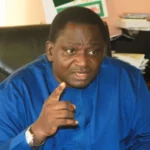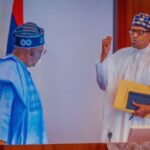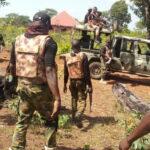The governors of the North East region have asked the federal government to address the causes of insurgency in their region.
The Chairman of North East Governors’ Forum (NEGF) and Governor of Borno State, Babagana Zulum spoke on Monday in company of Adamawa State governor, Ahmadu Fintri, after a closed door meeting at the Council Chamber, Presidential Villa, Abuja, with President Muhammadu Buhari and heads of security agencies.
- Insecurity: Buhari, security chiefs, North East govs meet in Presidential Villa
- Security tops agenda as Northeast governors meet in Maiduguri
Zulum said the north east governors met with President Buhari after the NEGF meeting held in Maiduguri on Saturday with a view to highlighting the key challenges in the region, especially issues of security, decaying infrastructure, particularly rock projects, cases of oil exploration, and issues of enhancing river basin development in the region among others.
He said they told the President of the need to not only create an enabling environment that would enable the people to go about their normal duties but also empower the police with the state-of-the-art equipment to bridge the existing gap and reduce the cases of insurgency.
Zulum, while reacting to the question on what they discussed with the President on insecurity, said: “The governments of the region have commended the efforts of federal government in securing the region.
“However, we told Mr president that there is need for the federal government to address the causes of insurgency, which are not limited to the endemic poverty, hunger among others.
“One of the root causes is that of access to farm lands, people need to go back to their farmlands, people need to be resettled in their original homes so that they can restart their means of livelihood. This is one of the reasons the insurgents are recruiting more into the sect. Therefore, creating enabling environment will enable the people to go about their normal duties and will no doubt reduce the cases of insurgency.
“We also recommended that police should be empowered, to be provided with certain state of the art equipment, armoured personnel carrier and so on with a view to bridging the manpower gap that we are having in the Nigerian military.”
Fielding questions from State House reporters on what would be his reaction to the toga of an ingrate placed on him after the recent attack and the suggestions that the military were not committed to solving the Boko Haram problem in Borno and the north east because of their “thriving business”, Zulum said: “We have had series of consultations after the attack and I think security is not only about federal government, there is need for the federal, States and the local government to come together with a view to provding solutions that will end this crisis in the region.
“But most importantly, there is war economy in the region and I think that is why we are here. So, I think the government is taking a bold step with a view to ensuring speedy resolution of some of the gray areas that we have in the region.”
Vice President Yemi Osinbajo, six of the North East Governors, Secretary to the Government of the Federation (SGF), Boss Mustapha, the National Security Adviser (NSA), Major General Babagana Monguno (retd), and the Chief of Staff to the President, Prof. Ibrahim Gambari attended the meeting.
The north east governors that attended the meeting also included Governors of Bauchi State, Bala Mohammed, Gombe State, Inuwa Yahaya, Taraba, Darius Ishaku, and Yobe, Mai Mala Buni.
The Chief of Defence Staff, General Gabriel Olonisakin, Chief of Army Staff, Lieutenant General Tukur Buratai, Chief of Naval Staff, Vice Admiral Ibok Ekwe Ibas, Chief of Air Staff, Air Marshal Sadique Abubakar, the Inspector-General of Police (IGP), Mohammed Adamu, and the Director General, Department of State Services (DSS), Yusuf Bichi were part of the meeting.
Also in attendance were the Director General, National Intelligence Agency (NIA), Ahmed Rufa’i, the Minister of Defence, Bashir Magashi, and the Minister of Police Affairs, Mohammad Dingyadi.

 Join Daily Trust WhatsApp Community For Quick Access To News and Happenings Around You.
Join Daily Trust WhatsApp Community For Quick Access To News and Happenings Around You.


